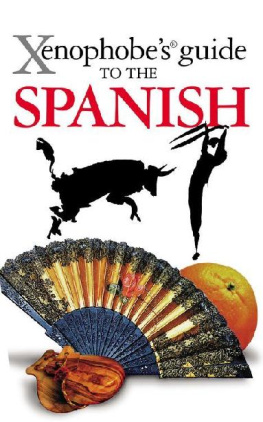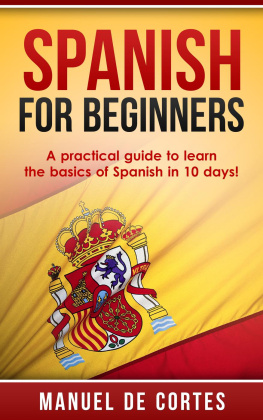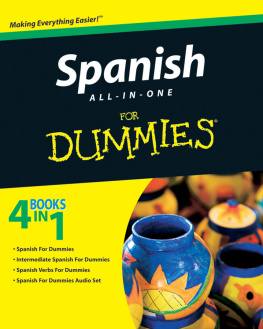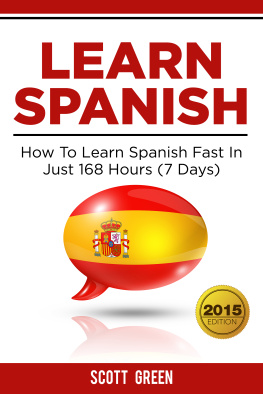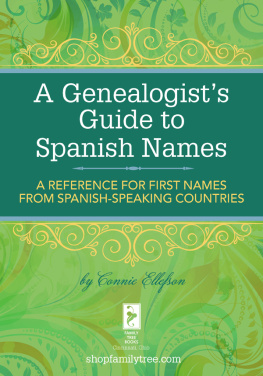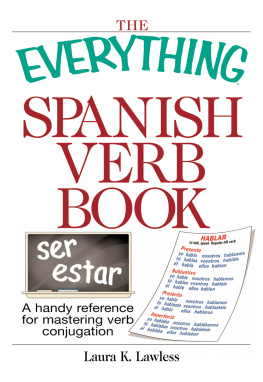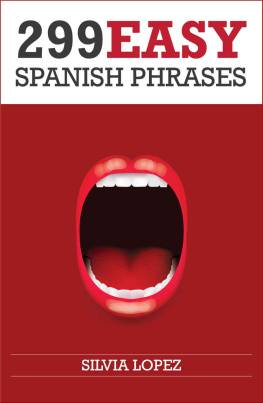Drew Launay - The Xenophobes Guide to the Spanish
Here you can read online Drew Launay - The Xenophobes Guide to the Spanish full text of the book (entire story) in english for free. Download pdf and epub, get meaning, cover and reviews about this ebook. City: New York, year: 2010, publisher: Oval Guides, genre: Home and family. Description of the work, (preface) as well as reviews are available. Best literature library LitArk.com created for fans of good reading and offers a wide selection of genres:
Romance novel
Science fiction
Adventure
Detective
Science
History
Home and family
Prose
Art
Politics
Computer
Non-fiction
Religion
Business
Children
Humor
Choose a favorite category and find really read worthwhile books. Enjoy immersion in the world of imagination, feel the emotions of the characters or learn something new for yourself, make an fascinating discovery.
- Book:The Xenophobes Guide to the Spanish
- Author:
- Publisher:Oval Guides
- Genre:
- Year:2010
- City:New York
- Rating:5 / 5
- Favourites:Add to favourites
- Your mark:
- 100
- 1
- 2
- 3
- 4
- 5
The Xenophobes Guide to the Spanish: summary, description and annotation
We offer to read an annotation, description, summary or preface (depends on what the author of the book "The Xenophobes Guide to the Spanish" wrote himself). If you haven't found the necessary information about the book — write in the comments, we will try to find it.
Abstract: A guide to understanding the Spanish that views them with the same lighthearted attitude that they themselves display in life
The Xenophobes Guide to the Spanish — read online for free the complete book (whole text) full work
Below is the text of the book, divided by pages. System saving the place of the last page read, allows you to conveniently read the book "The Xenophobes Guide to the Spanish" online for free, without having to search again every time where you left off. Put a bookmark, and you can go to the page where you finished reading at any time.
Font size:
Interval:
Bookmark:


Andalusians, Aragonese, Basques, Castilians, Galicians, though feeling distinct from each other, feel a good deal more different from foreigners.
The population of Spain is 46 million compared with 52 million English, 58 million Italians, 64 million French, 82 million Germans and around 307 million Americans.
Spain is four times as large as England but could fit into France with enough room to spare to accommodate Ireland.
The Spanish do not much care what other nations think of them, nor are they particularly patriotic. Such old sayings as the smoke of my native land shines more than the fire of others or If God were not God he would be the King of Spain, have long been discarded .
Spaniards know the colours of their flag because they believe the red stands for the blood of the bull and the yellow the sand on which it ends its days. They quite like the bull symbolising the country because they are moved by the tradition and pageantry of the conflict between man and beast and, as an icon, it helps sell vast quantities of brandy and quite a few beach towels.
When nationalism is enjoyable, the Spanish can be nationalistic.
When nationalism is enjoyable, the Spanish are feverently nationalistic, not having totally forgotten the fun they had in 1992 when, to their own amazement, they successfully organised an Olympic Games in Barcelona. Never having cared much about athletics, swimming or fencing before, they realised that being cheered on by the visiting world for running and jumping was rather gratifying, but when the games moved further afield, they rather lost interest.
Pride in their countrys achievements at football has been known to rise to the fore during World Cup matches, but if Spain gets knocked out early they will happily switch allegiance to any country that has a player showing promise of zest and gusto. Usually a South American.
They will stay glued to their television sets to watch the Oscars if a Spanish film has been nominated, not so much because they want it to win but because it is a great excuse to stay up all night. In Spain days are for siestas, nights for fiestas.
They think little of people in whose country they were bored.
The Spanish will only be aware of other nationalities if they have visited their country and had a great time. They will think little of people in whose country they were bored. As the majority of Spanish have failed to find any night life in Britain and cannot bring themselves to like the taste of flat, tepid bitter, they tend to ignore the English, regarding them as rather flat and tepid themselves .
As for the rest, the Spanish do not particularly differentiate Austrians, Chinese, Dutch, French, Germans, Italians, Japanese all are extranjeros (foreigners), which is not a stigma, though they are often referred to by the risible name of guiri from the word guirigay, meaning gibberish, the language most foreigners seem to speak.
Brazilians they rate highly because they drink and dance the night away, and never go to bed. Overall, the Spanish react to and judge the individual, not the horde, and what matters is whether or not people are amusing.
The Spanish are viewed as noisy, having no consideration for others, always being late for appointments if they turn up at all, totally unreliable and seeming never to go to bed, except in the afternoons. Worst of all, they appear indifferent to complaints, apparently capable of shrugging off any form of criticism.
What matters is whether or not people are amusing.
Andaluca happens to be the biggest region, the hottest, the poorest; its people are the most vivacious, produce the most exciting dances, music and colourful costumes. So, for the holiday tour organisers, it has been promoted as the real Spain, but it would be hard to imagine an Andalusian and a Galician sitting at a table eating their bread dipped in olive oil and garlic and arguing that either one of them was more Spanish than the other.
It is said that Spain is not so much a country, more an idea, the reality being a collection of powerful regional territories and identities. This is made even more complex by the issue of languages.
As time passed, various areas decided they wanted to show independence and started talking in different tongues.
In the 15th century when Isabel (the Castilian) and Fernando (the Arrogant) got married and united the regions of Castile and Aragon, there was a semblance of order, and castellano, the language spoken by Isabel, became the accepted form of communication. But as time passed, various areas decided they wanted to show independence and started talking in different tongues. When Franco emerged the victor of the uncivil war in 1939, he tried to unify the country by forbidding such nonsense. It only succeeded in driving these aspirations to autonomy underground. The moment he died, they all popped up, waving their own flags and screaming freedom.
In the Basque region, which they call Euskadia, the traffic indications are in Basque, they have their own Basque police force, raise and collect their own Basque taxes, run their own Basque schools, have their own Basque television channel, and maintain their very own terrorist group ETA (Euskadi Ta Askatasuna = Euskadia and Freedom).
In Catalua, with its capital Barcelona, they insist on speaking catalan and can be rude to Spaniards who make the mistake of addressing them in castellano . In Valencia they chatter away in a distinct variant of catalan and in Galicia they speak gallego.
There are 17 such regions in Spain, each with its own capital, flag and legislature, many toying with the idea of speaking a different language. But as you travel south, the sun thankfully gets hotter, the siesta gets longer, and enthusiasm for bringing out new dictionaries decreases.
As you travel south, the sun gets hotter and the enthusiasm for bringing out new dictionaries decreases.
Andalusians, Aragonese, Basques, Castilians, Galicians and Valencians, though feeling distinct from each other, feel a good deal more different from foreigners. That is as far as their nationalism goes. They will prefer to wave their separatist flags rather than the national flag because they like the different colours, but those people who demonstrate or discuss such feelings are politically oriented students or politically minded intellectuals, not the majority, who are indifferent.
There is, however, one exception to this rule. Ask a Catalan if he is a nationalist or in any way patriotic and he will answer passionately in the affirmative. He will not, however, be referring to Spain as his country, but Catalua.
The Spanish, if they think about it at all, which is doubtful, see themselves as totally acceptable people in a world where many are not.
Anyone attempting to understand the Spanish must first of all recognise the fact that they do not consider anything important except total enjoyment. If it is not enjoyable it will be ignored.
You cannot act upon the dictum When in Spain do as the Spanish do, because no-one knows what they will be doing next.
Font size:
Interval:
Bookmark:
Similar books «The Xenophobes Guide to the Spanish»
Look at similar books to The Xenophobes Guide to the Spanish. We have selected literature similar in name and meaning in the hope of providing readers with more options to find new, interesting, not yet read works.
Discussion, reviews of the book The Xenophobes Guide to the Spanish and just readers' own opinions. Leave your comments, write what you think about the work, its meaning or the main characters. Specify what exactly you liked and what you didn't like, and why you think so.

